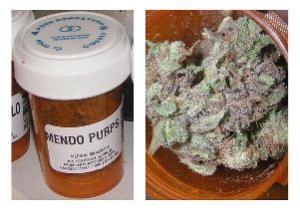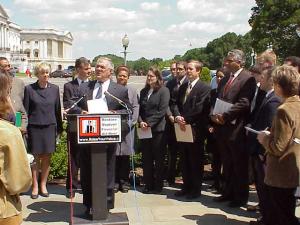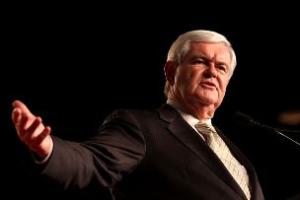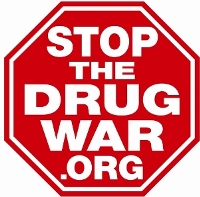Two medical marijuana state governors, Rhode Island Gov. Lincoln Chafee and Washington Gov. Christine Gregoire, on Wednesday called on the federal government to reschedule marijuana. In a joint 106-page petition to the DEA, they said states that have passed medical marijuana laws need to be able to regulate its distribution without fear of federal prosecution.
In what could be an important intervention in the debates over medical marijuana and pot legalization, the first study to examine the relationship between medical marijuana and traffic deaths found they declined in medical marijuana states.
As drug policy reform continues into its most consequential stage in decades, StoptheDrugWar.org plays a crucial role for leaders and organizations in the movement. But we need your help, more perhaps than ever, to keep the most important StoptheDrugWar.org service, the Drug War Chronicle newsletter, at full strength.
Should people convicted of federal crack offenses before the Fair Sentencing Act was in effect, but sentenced after it was in effect, be sentenced under the new law or not? The US Supreme Court says it will decide.
The drug reform movement is losing a key congressional ally. Rep. Barney Frank (D-MA) announced Monday he will retire at the end of this term.
Newt Gingrich laid out a hard-line approach to drug policy targeting US drug users as well as Mexican cartels in an interview Saturday.
Four of Vancouver's last five former mayors are calling for marijuana legalization, and they have been joined by the city's current mayor.
The Chicago suburb of Evanston has decriminalized the possession of up to 10 grams of marijuana in a bid to cut costs and save youth from criminal records.
Mexican human rights activists have filed a complaint in the Hague against President Calderon for human rights violations committed by Mexican security forces, also mentioning crimes committed by drug cartels. That and the killings and arrests continue, with no apparent impact on the flow of drugs north.
Facing prohibition-generated violence, the Honduran government has given the military full domestic policing powers.
It's prison guards gone wild this week, plus a really sleazy deputy gets a sweet deal and a 'roided cop takes a plea deal.
Events and quotes of note from this week's drug policy events of years past.
Two governors of medical marijuana states, Gov. Lincoln Chafee (I) and Washington Gov. Christine Gregoire (D) Wednesday called on the federal government to reschedule marijuana. In a joint 106-page petition to DEA head Michele Leonhart, they said marijuana needs to be classified as a drug with accepted medical uses so that states that have passed medical marijuana laws can regulate its distribution without fear of federal prosecution. They seem to want to get the word out too -- at the time of this writing, both governors' home pages link to press releases about the petition.

Gov. Gregoire's press release about the petition
The two governors speak from personal experience.
Chafee brought his state's plan to open distribution centers to a screeching halt in September, citing fears the state-regulated dispensaries would become the targets of federal enforcement actions. And this spring,
Gregoire vetoed key portions of a bill that would have set up a regulated dispensary system in Washington for similar reasons.
The governors asked the DEA to move marijuana from
Schedule I of the Controlled Substances Act, which is reserved for drugs with no accepted medical use and a high potential for abuse, to Schedule II, which includes drugs with a high potential for abuse, but with accepted medical uses. If moved to Schedule II, marijuana would be grouped with
opioid pain relievers such as morphine,
Dilaudid, and
Fentanyl; prescription amphetamines and
methamphetamines, such as Dexedrine and
Desoxyn; barbiturates, and cocaine.
Moving marijuana to Schedule II would allow it to be prescribed by doctors (medical marijuana states currently have laws specifying a doctor's recommendation -- not a prescription -- to get around DEA threats to doctors who would prescribe medical marijuana) and stocked in pharmacies, as well as sold in dispensaries, as it currently is.
The federal government has repeatedly refused to reschedule marijuana over the past 20 years. Most recently, in July,
the DEA denied a rescheduling petition brought by the
Coalition for Rescheduling Cannabis. That denial is being appealed.
In denying the petition, the DEA steadfastly maintained that: "Marijuana continues to meet the criteria for Schedule I control under the CSA because marijuana has a high potential for abuse, marijuana has no currently accepted medical use in treatment in the United States, and marijuana lacks accepted safety for use under medical supervision."
It is time for the DEA and the Food and Drug Administration to change their tunes, the governors said. "The divergence in state and federal law creates a situation where there is no regulated and safe system to supply legitimate patients who may need medical cannabis," they told
Leonhart.

Gov. Chafee's home page, featuring the petition
Their petition includes a substantive science-based report that has been peer reviewed and cites more than 700 independent references, many of which are new science since 2006. It details non-smoking methods, and describes how recent scientific developments like affordable DNA analysis supports the pharmacy model. With modern DNA analysis, the plant's beneficial compounds can be determined, and with current technology readily available today, a compounding pharmacist could easily and inexpensively quantify the levels of
cannabinoids, and then use the appropriate cannabis blend to create a customized medication for an individual patient.
"Poll after poll shows an overwhelming majority of Americans now see medical marijuana as legitimate,"
Gregoire said. "Sixty percent of voters in our state said yes on a 1998 ballot measure. An ever-growing number of doctors now tell thousands of suffering patients they may find relief from the unique medicinal qualities of cannabis. There is simply no question that pharmacists could safely and reliably dispense cannabis to patients -- just as they do for other controlled and more problematic drugs."
"Americans' attitudes toward medically prescribed marijuana are changing, and medical organizations throughout the country -- including the Rhode Island Medical Society and the American Medical Association -- have come to recognize the potential benefits of marijuana for medical use,"
Gov.
Chafee said. "Patients across Rhode Island and across the United States, many of whom are in tremendous pain, stand to experience some relief.
Gov.
Gregoire and I are taking this step to urge the federal government to consider allowing the safe, reliable, regulated use of marijuana for patients who are suffering."
"Sadly, patients must find their way along unfamiliar, uncertain paths to get what their doctors tell them would help -- medical cannabis to relieve their suffering,"
Gregoire said. "People weak and sick with cancer, multiple sclerosis, and other diseases and conditions suddenly feel like -- or in fact become -- law breakers. In the year 2011, why can't medical cannabis be prescribed by a physician and filled at the drug store just like any other medication? The answer is surprisingly simple. It can. But only if the federal government stops classifying marijuana as unsuitable for medical treatment."
Gregoire added that two years ago, the American Medical Association reversed its position and now supports investigation and clinical research of cannabis for medicinal use. And The American College of Physicians recently expressed similar support. Both the Washington State Medical Association and the Washington State Pharmacy support reclassification, as do the Rhode Island Medical Society and other state medical associations.

"Mendo Purp" medical marijuana (image courtesy Coaster420 via wikimedia.org)
Medical marijuana advocates reacted with elation to the governors' petition.But they also pointed out that we still have a long way to go.
"This is groundbreaking," said Kris Hermes, spokesman for
Americans for Safe Access (
ASA), the country's largest medical marijuana advocacy group. "To have two governors in a bipartisan move from states on opposite sides of the country with medical marijuana laws that are in jeopardy because of federal actions announcing that they want to see the federal government reclassify marijuana is a big deal indeed."
But it doesn't mean it's okay for them to hold up their own state medical marijuana programs, said
Drug Policy Alliance head Ethan
Nadelmann. "The governors' call for rescheduling marijuana so that it can be prescribed for medical purposes is an important step forward in challenging the federal government's intransigence in this area," said
Nadelmann. "But their call should not serve as an excuse for these two governors to fail to move forward on responsible regulation of medical marijuana in their own states. Governors in states ranging from New Jersey and Vermont to Colorado and New Mexico have not allowed the federal government’s ban on medical marijuana to prevent them from approving and implementing statewide regulation of medical marijuana.
Govs.
Gregoire and
Chafee should do likewise."
Similarly, the
Marijuana Policy Project (
MPP) also had a "mixed reaction" to the news, chiding the governors for not standing up more forcefully for patients.
"This is a good first step, in that it shows that politicians are catching up with the scientific consensus, which is that marijuana has medical value,” said Rob
Kampia,
MPP executive director. “If it succeeds, federal law will finally acknowledge that fact. Rescheduling marijuana, however, will not change the federal penalties for possessing, cultivating, or distributing medical marijuana. That is the change we really need. These governors should be insisting that the federal government allow them to run their medical marijuana operations the ways they see fit, which in these cases includes allowing regulated distribution centers to provide patients with safe access to their medicine and not force them to turn to illicit dealers.”
ASA is part of the coalition that is appealing the DEA decision in July not to reschedule marijuana. "This is something we're currently embroiled in, and we will continue to fight vigorously for the federal government to reschedule marijuana on our end and the governors' end as well," Hermes said.
"We applaud the leadership of the governors in urging the Obama administration to reclassify," he reiterated. "With the help of these governors and hopefully more, it's only a matter of time until marijuana is rescheduled."
back to top
A study released this week has found legalizing medical marijuana has resulted in a nearly 9% decline in traffic deaths and a 5% reduction in beer sales in states that allow it. The study is the first ever to examine the relationship between medical marijuana and traffic fatalities.

Reduces nausea, spasms -- and traffic accidents? (image courtesy Laurie Avocado via wikimedia.org)
The study,
Medical Marijuana Laws, Traffic Fatalities, and Alcohol Consumption, could be an important intervention in ongoing debates over medical marijuana and marijuana legalization, reformers said. Opponents of loosened marijuana laws use concerns over drugged driving and possible traffic fatalities as one of their most effective arguments against liberalization, and this study could lessen the effectiveness of that argument.
"Our research suggests that the legalization of medical marijuana reduces traffic fatalities through reducing alcohol consumption by young adults," said Daniel Rees, professor of economics at the University of Colorado Denver, who
coauthored the study with D. Mark Anderson, assistant professor of economics at Montana State University.
The economists analyzed traffic fatalities nationwide, including 13 states that legalized medical marijuana between 1990 and 2009. In those states, they found evidence that alcohol consumption by 20-29-year-olds went down, resulting in fewer deaths on the road. The researchers collected data from a variety of sources including the National Survey on Drug Use and Health, the Behavioral Risk Factor Surveillance System, and the Fatality Analysis Reporting System.
"We were astounded by how little is known about the effects of legalizing medical marijuana," Rees said. "We looked into traffic fatalities because there is good data, and the data allow us to test whether alcohol was a factor."
Anderson noted that traffic deaths are significant from a policy standpoint. "Traffic fatalities are an important outcome from a policy perspective because they represent the leading cause of death among Americans ages five to 34," he said.
According to a
recent report by the Centers for Disease Control, alcohol-impaired driving accounted for fully one-third of the 10,839 traffic fatalities in 2009. If the 9% reduction in fatalities reported by the researchers in medical marijuana states were applied nationwide, easy availability of marijuana could result in about 1,000 fewer traffic deaths a year.
Anderson and Rees noted that simulator studies conducted by other researchers showed that drivers under the influence of marijuana tend to avoid risks, while those under the influence of alcohol underestimate their degree of impairment, drive faster, and take more risks. But they cautioned that traffic deaths may have declined not because driving while high is safer than driving while drunk, but because medical marijuana is typically used in private, while alcohol is often consumed at bars and restaurants.
"I think this is a very timely study given all the medical marijuana laws being passed or under consideration," Anderson said. "These policies have not been research-based thus far and our research shows some of the social effects of these laws. Our results suggest a direct link between marijuana and alcohol consumption."
"Although we make no policy recommendations, it certainly appears as though medical marijuana laws are making our highways safer," Rees said.
Marijuana reform advocates who have studiously compared alcohol and marijuana liked what they heard.
"Every objective study on marijuana has concluded that it is far safer than alcohol for the user and society," said Mason
Tvert, executive director of
Safer Alternative For Enjoyable Recreation (SAFER) and coauthor of the book,
Marijuana is Safer: So why are we driving people to drink? "It should come as little surprise that when we allow adults to make the safer choice to use marijuana it results in less drinking and fewer alcohol-related problems."
Tvert coordinated the successful ballot initiatives in Denver that made it the first city in the nation to remove all penalties for adult possession (2005), and designated possession as its lowest law enforcement priority (2007). He is currently one of two formal proponents of a 2012 statewide initiative campaign to make marijuana legal in Colorado and regulate it like alcohol.
"This is far from conclusive, but the study definitely shows a clear correlation between medical marijuana laws and decreased traffic fatalities," said Morgan Fox, communications manager for the
Marijuana Policy Project. "The important thing is that is concurrent with a decrease in alcohol consumption."
"When these laws get passed, traffic fatalities go down, and that's important because fear of increased traffic fatalities is one of the biggest arrows in the quiver of foes," Fox noted. "This is going to make it easier for us to win that argument."
The argument could be applied not only to medical marijuana, but also to marijuana legalization in general, Fox said. "You certainly could make the argument that allowing it for recreational use instead of just medical would decrease the amount of alcohol consumed and reduce traffic fatalities," he said.
"If allowing the legal use of marijuana for medical purposes reduces alcohol consumption and traffic deaths, making it legal for personal use could reduce it dramatically,"
Tvert agreed. "It's time for our government to stop driving people to drink -- and drink and drive -- and start allowing them to make the rational, safer choice to use marijuana, if that is what they prefer."
back to top
Dear Drug Policy Reformer:
Many of our readers have stepped up to the plate the last several weeks to support our programs as we head into the important year 2012. We are deeply grateful for your confidence and generosity -- thank you!
We continue to seek your help for the most central and part of our web site, the
Drug War Chronicle newsletter.
The Chronicle reaches over a million people per year, before any reprinting on other web sites or redistribution to other email lists, and it serves the broadest set of purposes for the most of them. If you're not currently subscribed to the Chronicle, you can check it out and read the latest articles from it
here.
It's not a secret that the troubled economy has been very hard on nonprofits. Many good organizations have downsized dramatically, and some have even shut down. StoptheDrugWar.org is fortunate to still be here. But
we need your help, more perhaps than ever, to keep the most important StoptheDrugWar.org service,
Drug War Chronicle, at full strength.
Actually, we want to do
more than continue the Chronicle at its current level. We have an amazing expansion plan that includes reaching out to policymakers (nationally and internationally), a major social media effort, continuing the Legislative Center that you've heard of, more. But to credibly approach major funders for those programs, we need to be able to show them that our members are supporting us and that we have a full year's funding lined up for the newsletter itself.
If you haven't donated recently, would you make a donation today for this or other StoptheDrugWar.org programs?
Drug War Chronicle plays a crucial and unique role for individuals and organizations leading the charge with us for reform -- read what a few of them had to say recently about how:
Andrew Livingston, founder of Colgate University Students for Sensible Drug Policy:
Before I started Colgate University's chapter of Students for Sensible Drug Policy, I would stay up to date on issues in drug policy by reading stories in the Drug War Chronicle. The information I gained familiarized me with the growing movement for drug policy reform and stoked my passion to actively change our nation's unjust policies. Today I use StoptheDrugWar.org to keep myself informed and to teach other students in my SSDP chapter about the most up to date drug policy issues both within the United States and abroad.
Even though I am just a student I have already donated to StoptheDrugWar.org. Their work is indispensable to our cause, and I know it will continue to generate passionate young students like myself who want nothing more than to end our failed drug war policies.
Dale Gieringer, head of California NORML, recipient of the 2011 Robert C. Randall Award for Achievement in the Field of Citizen Action:
Drug War Chronicle is the single best source for drug war journalism. I can't praise Drug War Chronicle enough. Phil Smith deserves special kudos for his journalism. I regularly re-post your articles to our California lists. Please keep up the good work.
Adam Hurter, Massachusetts activist:
I've been drumming up a lot of support for medical marijuana and legalization here in Massachusetts, and StoptheDrugWar.org is my primary source for information that I use in talking to people about current drug policy reform issues. Without it I wouldn't be in the know myself. It's known in my circles as the primary source of drug policy news. In fact, people are pretty dependent on it at this point.
There is an incredible amount at stake in the fight to change drug policy right now -- this may truly be the most important moment in the issue we've seen in the entire history of the organization. States and the Congress are considering sentencing reform, and public support for marijuana legalization is finally reaching the 50% mark. Yet the government is conducting its most aggressive crackdown against medical marijuana -- just medical marijuana -- and regressive committee chairmen refuse to give important reform bills the fair hearings and consideration they are due.
We can't let them get away with that. And that's why we need your help to decide whether StoptheDrugWar.org and Drug War Chronicle can enter this historical moment at full strength and looking to grow. Will you step up today in meeting the needs of the times? Please make a generous donation to StoptheDrugWar.org -- non-deductible for our lobbying work, or tax-deductible for our educational work like Drug War Chronicle -- to help us enter the new year right.
Donations to our organization can be made online at http://stopthedrugwar.org/donate, or they can be mailed to: DRCNet Foundation (tax-deductible), P.O. Box 18402, Washington, DC 20036; or Drug Reform Coordination Network (non-deductible for lobbying), same address. (Contact us for information if you wish to make a donation of stock.)
Thank you for standing with us to stop the drug war's cruelties and meet the opportunity this time offers to make a brighter future. And don't get discouraged by the challenges our movement and the cause are currently facing: Time, and the truth, are on our side!
Sincerely,

David Borden, Executive Director
StoptheDrugWar.org
Washington, DC
http://stopthedrugwar.org
P.S. Reply to this email or use our contact form to send us your Drug War Chronicle testimonial!
back to top
The US Supreme Court announced Monday that it will decide whether a federal law designed to reduce the disparity between crack and powder cocaine sentences should be applied to those who were convicted, but not sentenced, before it came into effect.
The court granted
certiori to two appellants,
Edwin Dorsey and
Corey Hill, both of whom were convicted of federal crack cocaine offenses before the 2010 Fair Sentencing Act went into effect, but not sentenced until after it was in effect. Lower courts split on whether the act should apply, but the US 7
th Circuit Court of Appeals in Chicago held it should not.
The cases of people like Dorsey and Hill, whose cases were not complete when the law went into effect are known as "crack cases in the pipeline," or "pipeline" cases.
The Fair Sentencing Act reduced the disparity between the amount of crack cocaine and the amount of powder cocaine needed to trigger federal mandatory minimum sentences by increasing the amount of crack needed to trigger such sentences, and lessened the penalties for crack offenses specified by the federal sentencing guidelines system. Once a 100:1 ratio between weight of crack cocaine vs. powder cocaine, the disparity was reduced to 18:1. At the beginning of November, the reductions were made retroactive, allowing up to 12,400 prisoners to file motions seeking early release. But "pipeline" cases were caught in a lacunae.
The Supreme Court will hear the two cases together in oral argument. A decision in the cases is expected by June.
back to top
Advocates of drug policy reform are losing a key ally on Capitol Hill. Rep. Barney Frank (D-MA) announced Monday that he will not seek reelection and will retire at the end of this term in January 2013.

Barney Frank at press conference calling for repeal of a law that denies financial aid to students because of drug convictions
Frank, 71, has served in Congress for 30 years and is now the ranking minority member of the House Financial Services Committee. The openly gay congressman has been a liberal stalwart throughout his tenure on the Hill and among the strongest congressional advocates of drug policy reform.
Beginning in 2001, Frank repeatedly introduced bills that would block the government from intervening in states with medical marijuana laws, and since 2008, he has introduced bills that would decriminalize marijuana possession. This year, he teamed up with libertarian Republican Rep. Ron Paul (R-TX) to introduce the
Ending Federal Marijuana Prohibition Act. That bill currently has 19 cosponsors.
Frank was also the lead sponsor of the "Removing Impediments to Students' Education" act to repeal a provision added to the Higher Education Act in 1998 that delays or denies federal financial aid to students because of drug convictions. The law was scaled back in 2006 to apply just to offenses committed while one is in college and receiving aid, and in 2009 the House of Representatives passed language as part of a student aid funding bill that would have limited it further to just sales convictions. (The section of the 2009 bill containing that language was stripped as part of Democrats' strategy to pass health care reform, in which the health care reform and education bills were combined.)
In 1994 Frank was one of four members of Congress, a Democrat and Republican from both the House and Senate, who advanced "safety valve" legislation to allow judges to exempt first-time drug offenders from five- and ten-year mandatory minimum sentences under specified circumstances.
None of his marijuana law reform bills have come close to passage, but Frank gets big kudos from the reform community for his tireless efforts. His sponsorship of marijuana reform legislation has helped change the conversation in Congress, a process he admitted in a
2009 interview with Esquire is still far from complete.
"Announcing that the government should mind its own business on marijuana is really not that hard," he said. "There's not a lot of complexity here. We should stop treating people as criminals because they smoke marijuana. The problem is the political will. This is a case where there's cultural lag on the part of my colleagues. If you ask them privately, they don't think it's a terrible thing. But they're afraid of being portrayed as soft on drugs."
Frank's bold and straightforward stance has helped begin to change that, but with his impending retirement, marijuana and larger drug policy reform will lose a champion in Congress. His seat may remain Democratic, but there are few Democrats who have been as good as Barney Frank when it comes to trying to end the drug war.
back to top
Republican presidential nominee contender Newt Gingrich said Saturday he would favor the use of the death penalty against Mexican drug trafficking organization leaders. The comments came in an interview with Yahoo News in which the former Georgia congressman and Speaker of the House also called medical marijuana in California "a joke" and suggested he would try to make life miserable for US drug users as a means of driving down drug use rates.

GOP presidential contender Newt Gingrich (wikimedia.org)
Gingrich is now a leading contender for the Republican nomination. According to
Real Clear Politics, which averages all polls, Gingrich is in first place nationally with 23.8%, ahead of his closest contender, Mitt Romney, who has 21.3%.
"My general belief is that we ought to be much more aggressive about drug policy, and that we should recognize that the Mexican cartels are funded by Americans," Gingrich said.
When asked if he stood by his 1996 legislation that would have given the death penalty to drug smugglers, he replied in the affirmative.
"I think if you are, for example, the leader of a cartel, sure," he said. "Look at the level of violence they've done to society. You can either be in the Ron Paul tradition and say there's nothing wrong with heroin and cocaine or you can be in the tradition that says, 'These kind of addictive drugs are terrible, they deprive you of full citizenship and they lead you to a dependency which is antithetical to being an American.' If you're serious about the latter view, then we need to think through a strategy that makes it radically less likely that we're going to have drugs in this country."
Gingrich suggested that Singapore, which imposes corporal punishment for minor offenses and the death penalty for drug offenses, was a role model. "Places like Singapore have been the most successful at doing that," Gingrich said. "They've been very
draconian. And they have communicated with great intention that they intend to stop drugs from coming into their country."
For Gingrich, being aggressive on drug policy also "means having steeper economic penalties and it means a willingness to do more drug testing."
He elaborated on what he had in mind in response to another question: "I think that we need to consider taking more explicit steps to make it expensive to be a drug user," he said. "It could be through testing before you get any kind of federal aid. Unemployment compensation, food stamps, you name it."
Gingrich said that he wasn't a fan of imprisoning drug users and instead suggested that they be subjected to forced drug treatment. "I think finding ways to sanction them and to give them medical help and to get them to detox is a more logical long-term policy," he said.
Regarding medical marijuana, Gingrich, said he would continue current federal policy "largely because of the confusing signal that steps towards legalization sends to harder drugs [sic]." He also rejected letting states set their own policies "because I think you guarantee that people will cross state lines if it becomes a state-by-state exemption."
He also threw in a gratuitous jab at California's medical marijuana law. "I think the California experience is that medical marijuana becomes a joke," he said. "It becomes marijuana for any use. You find local doctors who will prescribe it for anybody that walks in."
GOP contenders Texas Congressman Ron Paul and former New Mexico
Gov. Gary Johnson have taken firm anti-prohibitionist stands on drug policy, but they are finding little support among voters for a party that claims to be for limited government and states' rights. Newt Gingrich's comments on drug policy are only the latest indication that for most Republicans, continuing to fight the war on drugs trumps other party principles.
(This article was published by StoptheDrugWar.org's lobbying arm, the Drug Reform Coordination Network, which also shares the cost of maintaining this web site. DRCNet Foundation takes no positions on candidates for public office, in compliance with section 501(c)(3) of the Internal Revenue Code, and does not pay for reporting that could be interpreted or misinterpreted as doing so.)back to top
Four of Vancouver's last five former mayors called last week for end of marijuana prohibition, saying anti-pot policies have failed to reduce marijuana's availability and that prohibition has fueled violence in British Columbia communities. Thursday evening, current Vancouver Mayor Gregor Robertson joined his predecessors, adding his voice to the call.

Free the weed, say Vancouver mayors (image courtesy the author).
In an
open letter released November 23, former mayors Mike Harcourt (1980-1986), Philip Owen (1993-2002),
Larry Campbell (2002-2005), and Sam Sullivan (2005-2008) called on the province's politicians to legalize and regulate pot in BC. The letter was released by
Stop the Violence BC, which just last month published a
report outlining the links between marijuana prohibition and organized crime and violence and calling for a regulated, public health approach to marijuana.
"Marijuana prohibition is -- without question -- a failed policy," the former mayors wrote. "It is creating violent, gang-related crime in our communities and fear among our citizens, and adding financial costs for all levels of government at a time when we can least afford them. Politicians cannot ignore the status quo any longer; they must develop and deliver alternative marijuana policies that avoid the social and criminal harms that stem directly from cannabis prohibition."
The ex-mayors' intervention comes as the Canadian federal government of Conservative Prime Minister Steven Harper is attempting to push through a crime bill that would, among other things, impose mandatory minimum prison sentences for growing as few as five plants. But that's not a popular position in British Columbia, where a recent Angus Reid poll had support for taxing and regulating marijuana at 69%. It is past time for elected officials to get on board the marijuana reform bandwagon, the ex-mayor's said.
"Clearly, elected officials are out of step with their public on marijuana prohibition," they wrote. "It is time that elected officials enter the debate and deliver specific proposals to address the easy availability of cannabis to youth and the organized crime concerns stemming directly from cannabis prohibition."
One elected official who has heeded that call is current Vancouver Mayor Robertson. In a
tweet sent out the following evening, Robertson said, "Good to see 4 Vancouver ex-mayors calling for end of cannabis prohibition. I agree, we need to be smart and tax/regulate."
In British Columbia, at least, the wall of silence by elected officials around legalizing marijuana has been breached. Whether that will lead to BC retaking its spot in the vanguard of pot law reform worldwide remains to be seen, but it's a good start.
(Drug War Chronicle's 2003 interview with Mayor Campbell is online here.)back to top
Even as Chicago ponders whether to decriminalize pot possession, one of its suburbs has gone ahead and done it. The city of Evanston Monday night passed its 2012 budget, complete with an ordinance that decriminalizes the possession of less than 10 grams of marijuana.
People caught with fewer than 10 grams would be ticketed and fined, but would face no jail time and no criminal record. Up until now, they would have been charged with a misdemeanor and faced up to six months in jail.
City council members and Evanston Mayor Elizabeth
Tisdahl said that decriminalization would prevent young people from being burdened with a criminal record and would free up police and prosecutorial resources in the revenue-strapped town.
"There is a high amount of paperwork and time that is spent going to court,"
Alderwoman Melissa
Wynne told the
Daily Northwestern. "It's not just the arrest, but then the processing and follow-through that takes a lot of time."
"A one-time violation by someone with that level of possession could be a teenager or someone in college," said Alderman Donald Wilson. "I wouldn't want to see people suffer the long-term consequences of something that might just be short-term misconduct."
Alderman Peter
Braithwaite cited a higher rate of marijuana arrests among black youths in the city in explaining his support for decriminalization. "I'm definitely very concerned about the number of black teens who end up in the criminal justice system and how that affects their futures and abilities to get jobs later in life," he said.
Marijuana law reform is definitely in the air in the Chicago area. The Cook County Board of Commissioners okayed decriminalization in unincorporated areas of the county in 2009 and then expanded that remit to include all jurisdictions in the county that don't have their own police forces. The suburban city of Skokie recently decriminalized possession of less than 10 grams for teenagers, and the city of Chicago is currently considering a decriminalization move.
back to top
by Bernd Debusmann Jr.
Mexican drug trafficking organizations make billions each year smuggling drugs into the United States, profiting enormously from the prohibitionist drug policies of the US government. Since Mexican president Felipe Calderon took office in December 2006 and called the armed forces into the fight against the so-called cartels, prohibition-related violence has killed around 40,000 people, including more than 15,000 last year. The increasing
militarization of the drug war and the arrest or killing of dozens of high-profile drug traffickers have failed to stem the flow of drugs -- or the violence -- whatsoever. The
Merida initiative, which provides $1.4 billion over three years for the US to assist the Mexican government with training, equipment and intelligence, has so far failed to make a difference. Here are a few of the latest developments in Mexico's drug war:
Friday, November 18
In Tijuana,
$15 million -- thought to belong to the Sinaloa Cartel -- was confiscated from a safe house. Six kilos of cocaine and four weapons were also found during the army raid, although no arrests were made.
Monday, November 21
In
Ciudad Acuna,
Coahuila,
three police officers were kidnapped while on patrol and executed.
In Harris County, Texas, a
controlled-delivery by police officers attempting to catch a drug shipment went awry when suspected
Zetas cut off and shot dead a truck driver who had secretly been working with the authorities. A nearby Sheriff's deputy was also wounded, possibly by friendly fire in the chaos. Four men, three of whom are Mexican citizens, were taken into custody and charged with capitol murder. It is still unclear if the men were targeting the informant or attempting to rip off his 300-pound load of marijuana.
Tuesday, November 22
In
Ciudad Juarez,
two police officers were killed while riding in an unmarked car. Authorities recovered 44 bullet casings at the scene.
Wednesday, November 23
In
Sinaloa,
at least 20 people were killed in several incidents. In
Culiacan, 13 people were found dead inside two vehicles which had been set fire in two different locations. Near
Guasave, three men were shot and killed. In the municipality of
Mocorito, four people were murdered. Mexican media has speculated that at least some of the killings may be related to a fight between the
Sinaloa Cartel and a faction of the
Beltran-Leyva Organization.
Thursday, November 24.
In
Tamaulipas,
the army announced that a large weapons cache and almost two tons of marijuana were captured during a series of operations in the city of Miguel
Aleman, across the Rio Grande from Starr, Texas. The weapons cache included a rocket launcher and ten explosive devices, including pipe bombs. Miguel
Aleman is currently controlled by a faction of the Gulf Cartel.
In Guadalajara,
26 men were found bound, gagged, executed and dumped in three vehicles. Many of the men had been asphyxiated, and some appear to have been shot. Notes left written on the victims and a banner left at one of the crime scenes suggest that the killings were carried out by the
Zetas and by members of an allied organization, the
Millenium Cartel. Some Mexican media outlets have speculated that the killing is in response to the September dumping of 35 men, many purportedly
Zetas killed by the
Sinaloa Cartel.
Friday, November 25
In the Hague,
Mexican activists filed a war crimes complaint against Mexican President Felipe Calderon. According to the coalition behind the complaint, Mexican security forces have been involved in approximately 470 cases of human rights violations. The complaint filed in the Netherlands also mentions crimes committed by drug cartels, and specifically mentions
Sinaloa Cartel boss Joaquin "El
Chapo" Guzman. The Mexican government immediately denied the accusations.
In Mexico City,
the city's police chief announced that an investigation would take place to determine the circumstances behind a journalist's video, which shows a police officer dunking a man's head into a bucket following a
firefight between gunmen and police in the crime-ridden neighborhood of
Tepito.
In
Matamoros,
the son of a deceased Gulf Cartel boss was captured. Antonio
Ezequiel "El Junior"
Cardenas Guillen, 23, is the son of Antonio
Ezequiel Cardenas Guillen Sr., "Tony
Tormenta," who was killed in a
firefight with Marines in November 2010. El Junior was arrested with four associates -- including two suspected cartel accountants -- as he left a party.
Saturday, November 26
In Nuevo Leon,
three alleged Zetas suspected of involvement in the July killing of two men who served as bodyguards for the state's governor were arrested during a traffic stop. Authorities said the men also confessed to four other killings, three of whom were police officers murdered in May.
In the city of Chihuahua,
two men and a woman were shot and killed. The two men tried run away after their car was cut off by gunmen, but were shot as they ran. The female was killed in the automobile. Police have no leads in the case.
Monday, November 28
In
Ciudad Juarez,
a four-year-old boy was shot and killed while playing outside a neighbor's house. Alan David Carrillo was playing with several other children outside the home when it was sprayed with automatic weapons. He was rushed to a hospital but died there shortly after arriving.
In
Hermosillo, Sonora
, a prominent member of Mexico's Movement for Peace and Justice and Dignity was shot and killed.
Nepomuceno Moreno, 56, was shot at least seven times by a gunman in a passing car. Last year, Moreno had accused hooded police officers of kidnapping his 18-year old son, who was never seen again. For their part, the Sonora Attorney General’s office has said that the principal line of investigation in the case is that Moreno was somehow involved with organized crime groups. In 1979, he was arrested in Arizona for heroin smuggling and possession, and is also said to have been involved in more recent criminal activity.
[Editor's Note: We have been conservatively estimating Mexican drug war deaths this year after El Universal quit publishing a box score. As of mid-November, we had estimated 8,100 deaths so far this year, but in light of new figures have revised that figure upward by about 3,000 deaths. Even that figure is an estimate, no more, until there is some official toll reported.]
Total Body Count for 2007 (
approx.): 4,300
Total Body Count for 2008 (
approx.): 5,400
Total Body Count for 2009 (
approx.): 9,600
Total Body Count for 2010 (official): 15,273
Total Body Count for 2011 (
approx.): 11,300
TOTAL: > 45,000
back to top
The Honduran congress voted overwhelmingly Tuesday to send out the armed forces to combat Mexican drug trafficking organizations. The vote gives the military broad domestic policing powers, including additional powers in the fight against the cartels.

Honduran army troops training with US Marines (wikimedia.org)
"We cannot have an armed forces only for foreign threats when there are so many deaths in the country because of violence," Juan Orlando Hernandez, president of the Congress, said before the vote in remarks reported by
CNN. "We are making this decision to support the Honduran people."
According to the United Nations, Honduras has the world's highest murder rate, with more than 82 murders per 100,000 people last year. By comparison, Mexico, where more than 45,000 people have been killed since President Felipe Calderon deployed the military against the cartels there five years ago, has a murder rate of 18 per 100,000 and the US 4.8.
About 20 people a day are murdered in Honduras, and most accounts blame most of the killings on drug cartels smuggling cocaine from South America. Under pressure in their home country, the Mexican cartels have expanded operations throughout Central America. El Salvador and Guatemala are also finding themselves running up against brazen cartel gunman.
The crime problem is aggravated by the existence of violent street gangs, and the national police have proven both ineffectual and corrupt. The move to involve the military in policing comes just after President
Porfirio Lobo was forced to begin a purge of the national police, of whom 167 have just been arrested for charges ranging from corruption to murder.
While the Honduran military had already been involved in operations against the cartels, it had been limited to assisting police and could only go on joint operations with police. Soldiers did not have the power of arrest, nor could they collect evidence or send cases to prosecutors.
That has now changed. The military has full domestic policing powers, including making arrests, doing searches, and executing warrants in law enforcement matters. But armed forces spokesman Col.
Alcides Flores said the military is not displacing the police, nor is it imitating Mexico, whose armed forces have been sullied by accusations of corruption and human rights violations during its campaign against the cartels.
"The new decree authorizes the armed forces to make captures without a police presence, but we are just augmenting the capacity of the police," he said. "At no time are we replacing the police. And we are not following the Mexican model. We are making a Honduran model," he said.
back to top
It's prison guards gone wild this week, plus a really sleazy deputy gets a sweet deal and a 'roided cop takes a plea deal. Let's get to it:
In Athens, Ohio,
a former Athens County sheriff's deputy pleaded guilty Monday to four lesser charges after originally being arrested on charges he coerced sex from female drug defendants. None of the charges Jerry
Hallowell, 44, pleaded guilty to are sex offenses. Instead he copped to one charge of soliciting or receiving improper compensation (which was apparently sexual favors), a first-degree misdemeanor; plus three fifth-degree felony charges of misusing an official statewide electronic database available to police officers.
Hallowell allegedly used the Ohio Law Enforcement Gateway to run background checks on women he was interested in. The felonies carry a maximum sentence of one year each, but
Hallowell will probably not do any time because he was convicted of the lowest level nonviolent felonies.
In Norfolk, Virginia,
a former Norfolk police officer pleaded guilty November 23 to selling steroids, syringes, and marijuana to an undercover officer. Kristin Wayne Harris, 37, copped to one count of drug possession and one count of sale of an anabolic steroid. He was originally charged with 11 drug-related felonies and two misdemeanors, but prosecutors dropped all the charges except for two. The investigation into Harris' steroid sales also led to the resignation of three other Norfolk police officers, but he was the only one charged with a crime. He's looking at anywhere from six months to 20 years in prison when sentenced.
In Fort Lauderdale, Florida,
a Florida state prison guard was arrested November 22 for agreeing to smuggle drugs into the prison. Ormond Rossi, 37, a guard at the Broward Correctional Institution, is charged with bribery and opium trafficking. He went down in a sting after agreeing to smuggle pain pills in return for cash, cigarettes, two water bottles full of vodka, and an unlisted number of steaks. At last report, he was still behind bars.
In Detroit,
a prison guard and a former prison guard were arrested November 23 on charges they smuggled marijuana and tobacco into the Ryan Correctional Facility. Guard Joseph Jordan, 27, and former guard Corey Young, 37, were both charged with misconduct in office, furnishing contraband to a prisoner, and conspiracy to furnish marijuana to a prisoner. Young was also charged with bringing contraband into a prison, bringing a weapon into a prison, and four counts of furnishing contraband to a prisoner. They allegedly accepted payments from inmates' friends and relatives in exchange for smuggling tobacco and pot, and went down in an investigation after a prisoner was found with weed and tobacco in his cell. Each felony count is worth five years.
In Atlanta,
a former Fulton County Jail guard pleaded guilty Tuesday to accepting bribes to help distribute cocaine within the jail.
Akil Scott, 31, copped to attempted possession with intent to distribute cocaine and accepting a $650 bribe. Prosecutors said he twice accepted $650 from undercover agents to deliver what he thought was seven grams of cocaine. Sentencing is set for February 16. Scott is looking at up to 20 years in federal prison on each count.
back to top
December 5, 1933: The passage of the 21st Amendment repeals prohibition of alcohol. Prohibition ends a little after 5:00pm EST when Utah becomes the 36th state to ratify the amendment.
December 2, 1993: Notorious drug lord Pablo Escobar is hunted down and killed by Colombian police making use of US technology. At his funeral days later, tens of thousands of
Medellin residents come out to mourn him.
December 7, 1993: During a speech at the National Press Club, US Surgeon General
Joycelyn Elders says: "I do feel that we would markedly reduce our crime rate if drugs were legalized, but I don't know all the ramifications of this... I do feel that we need to do some studies. In some of the countries that have legalized drugs, they certainly have shown that there has been a reduction in their crime rate and that there has been no increase in the drug use rate."
December 3, 1998: Colombian police seize about seven tons of cocaine in Cartagena, Colombia, destined for the US via Cuba.
December 1, 2000: President of Uruguay Jorge
Batlle is quoted in El
Observador suggesting legalization of drugs.
December 6, 2000: Belgium's parliament decriminalizes possession, consumption and trade in up to five grams of marijuana or hashish.
December 4, 2001: Canada's Auditor General releases a report on the federal government's role in dealing with illicit drugs. Part of the report reads: "Eleven federal departments and agencies are involved in the effort to control illicit drugs at a cost of about $500 million a year... But they don't know the extent of the problem and whether or not they are succeeding in their efforts."
December 7, 2001: John P. Walters is sworn in as head of the Office of National Drug Control Policy.
December 7, 2001: The Long Beach Press-Telegram (CA) reports that a Poly High School senior who played bass in the school orchestra committed suicide by shooting himself in the head after being booked on marijuana possession charges. His aunt said he was humiliated by his arrest. "All he repeated to his mother on the way home was 'they treated me like a common criminal,'" she said.
December 2, 2002: Reuters reports that an independent study concluded marijuana use does not lead teenagers to experiment with hard drugs like heroin or cocaine. The study by the private, nonprofit RAND Drug Policy Research Center countered the theory that marijuana acts as a so-called gateway drug to more harmful narcotics, a key argument prohibitionists use against legalizing marijuana in the United States.
back to top














